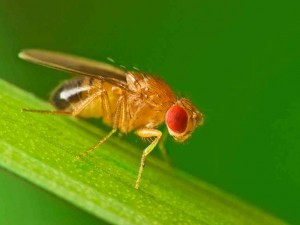Fruit flies, those tiny, annoying pests buzzing around your kitchen, are a common nuisance, especially during warmer months. They seem to appear out of nowhere, drawn to the irresistible aroma of ripening fruits and vegetables. If you’re battling a fruit fly infestation, you’re likely searching for quick and effective solutions. One common question that arises is: Does Alcohol Kill Fruit Flies? The answer is yes, alcohol can be an effective tool in your fruit fly fighting arsenal. This article will delve into how alcohol works against fruit flies and explore various methods to utilize it, alongside other proven strategies, to rid your home of these persistent pests.
 Close-up of a fruit fly with red eyes, a common household pest attracted to overripe fruit, illustrating the topic of alcohol's effectiveness in fruit fly control.
Close-up of a fruit fly with red eyes, a common household pest attracted to overripe fruit, illustrating the topic of alcohol's effectiveness in fruit fly control.
Understanding Fruit Flies and Why They’re a Problem
Fruit flies, scientifically known as Drosophila melanogaster, are small, typically about 1/8 inch long, and often have distinctive red eyes. They are most prevalent in late summer and early fall because they are strongly attracted to fermenting sugars found in overripe and decaying fruits and vegetables. Beyond being a mere annoyance, fruit flies can contaminate food sources. While they don’t bite or sting, their presence is unsanitary and indicates underlying issues like decaying organic matter.
Fruit flies have a rapid life cycle, completing it in about a week. A single female can lay up to 500 eggs, meaning a small initial infestation can quickly explode into a large-scale problem if conditions are favorable. They breed in moist areas where organic material is decomposing, such as:
- Garbage disposals
- Sink drains
- Empty beverage cans and bottles
- Trash cans
- Spilled food and drinks
How Does Alcohol Kill Fruit Flies?
Alcohol’s effectiveness against fruit flies stems from its properties as a dehydrating agent and a mild neurotoxin. When fruit flies come into contact with alcohol, particularly isopropyl alcohol (rubbing alcohol), it disrupts their outer protective layer, leading to rapid dehydration. Furthermore, the fumes and direct contact with alcohol can negatively impact their nervous system, leading to paralysis and death.
While consuming alcohol in sugary traps might attract and eventually drown fruit flies due to the liquid and detergent combination, direct contact or exposure to concentrated alcohol fumes is more immediately lethal. This makes methods like rubbing alcohol sprays highly effective for direct control.
Effective Alcohol-Based Methods to Kill Fruit Flies
Several methods utilize alcohol to combat fruit fly infestations. Here are some of the most effective:
1. Rubbing Alcohol Spray
One of the simplest and most direct methods is using a rubbing alcohol spray.
- Method: Fill a fine-mist spray bottle with isopropyl rubbing alcohol (70% or 90% concentration works well). When you see fruit flies, spray them directly.
- Effectiveness: Direct contact with rubbing alcohol will quickly kill fruit flies. You’ll notice them drop almost immediately.
- Clean-up: Dead fruit flies are easily cleaned up with a damp cloth or paper towel.
- Caution: While generally safe for household use, avoid spraying directly on polished surfaces or delicate materials without testing a small, inconspicuous area first.
2. Alcohol Traps (Vinegar or Wine Enhancement)
While vinegar and wine traps are effective on their own, adding a bit of alcohol can enhance their attractiveness and lethality.
- Method: Prepare a trap using a jar or bowl filled with apple cider vinegar or white wine (as suggested in the original article). Add a few drops of dish soap to break surface tension. For an alcohol boost, add a tablespoon of rubbing alcohol or a shot of a stronger alcohol like vodka to the mixture. Cover the top with plastic wrap and poke small holes or use a paper cone funnel.
- Effectiveness: The sweet scent attracts fruit flies, and they become trapped in the liquid. The added alcohol can further intoxicate or kill them upon contact and consumption.
- Why it works: The vinegar or wine attracts them, the soap traps them, and the alcohol enhances the killing power.
3. Drain Cleaning with Alcohol (Indirect Approach)
While not a direct killer in drains, alcohol can play a role in cleaning drains and eliminating breeding grounds.
- Method: After cleaning your drain with a mixture of baking soda and vinegar or a commercial drain cleaner, you can pour down a cup of rubbing alcohol.
- Effectiveness: Alcohol can help to further sanitize the drain, killing any remaining larvae or eggs and eliminating odors that attract fruit flies. It also helps to evaporate excess moisture, making the drain less hospitable.
- Note: This is more of a preventative and sanitizing step rather than a direct “alcohol kill” method in drains.
Other Effective Fruit Fly Control Methods
While alcohol is a valuable tool, a comprehensive approach to fruit fly control includes these essential steps:
-
Eliminate the Source: The most crucial step is to find and remove the breeding source. This means:
- Discarding overripe or rotting fruits and vegetables.
- Cleaning up spills immediately.
- Emptying trash cans regularly, especially kitchen bins.
- Cleaning and drying sinks and countertops.
- Checking for hidden sources like forgotten fruit bowls or neglected produce.
-
Clean Sinks and Drains: Regularly clean your kitchen sink and drains to eliminate food debris buildup. Baking soda and vinegar followed by flushing with hot water is a good routine.
-
General Sanitation: Maintain a clean kitchen environment. Wipe down counters, sweep floors, and ensure no food scraps are left out.
Prevention is Key
Once you’ve eliminated a fruit fly infestation, prevention is crucial to avoid future problems.
- Store fruits and vegetables properly: Refrigerate ripe produce or store it in sealed containers.
- Regularly clean: Keep your kitchen clean, paying attention to sinks, drains, and garbage areas.
- Promptly dispose of waste: Don’t let trash, especially food waste, accumulate indoors.
- Inspect produce: Check fruits and vegetables for signs of overripeness or damage when you bring them home.
Conclusion
Yes, alcohol, particularly rubbing alcohol, is an effective way to kill fruit flies. Direct sprays and alcohol-enhanced traps can significantly reduce their populations. However, for long-term control, combining alcohol-based methods with source elimination, sanitation, and preventative measures is essential. By understanding how alcohol works and implementing these comprehensive strategies, you can effectively manage and prevent fruit fly infestations in your home, keeping your kitchen pest-free and pleasant.
